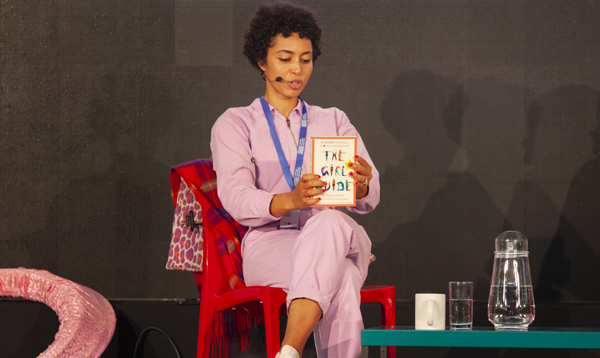This resource is great for:
Starting conversations around issues including puberty, growing up, and dealing with embarrassing situations.
Summary:
An interview with The Girl Guide author Marawa Ibrahim and associated activities to get you talking about what it’s like to be a teenage girl.
Introduction:
Marawa Ibrahim’s The Girl Guide is an open and honest, yet entertaining, guide to puberty and growing up. Ahead of her event with us at last year’s Edinburgh International Book Festival, Young Scot prize winner Elissa got the opportunity to chat to Marawa and ask her some tricky questions about all things growing up as a girl.
Read the interview in full here.
Then use our discussion points and activities to start talking and thinking about some of the challenges you might be dealing with too.
Activities
Part One – Anonymous Advice
When I was maybe 10 or 12, this was the book I really wanted and was looking for.
Everyone’s got questions about growing up which they don’t know the answers to and might be too embarrassed to ask. But it can be useful to talk about them – whether you find out the answers, or just feel reassured that other girls feel the same way.
- Each take a piece of paper and write down any questions you have about growing up.
- Put all of the questions in a bowl and then each choose a question at random.
- Read out your question and try to start a discussion around it. Does anyone know the answer, or have they wanted to ask the same question? Does anyone feel confident enough to share their experiences?
- Have a laptop (or a copy of The Girl Guide!) on hand to find information. Make sure you only use reputable websites though – there’s a lot of unreliable information online. A teacher can advise.
Part Two – Embarrassing Stories
Public embarrassment is difficult. It’s easy to say, much harder to do, but you have to just find a way to see the funny side.
Why not share some of your embarrassing stories with each other? Again, you can do this anonymously or openly – it depends how confident you all are!
You could write them on a piece of paper and read someone else’s story, or if you’re brave enough you could share them yourselves. The point is to find the humour in the stories and stop finding them so embarrassing – but make sure you’re laughing with, not at, each other.
Part Three – Girls for Girls
In The Girl Guide Marawa talks about Girls for Girls and the problem with women putting down other women.
Is this something you’ve experienced or been involved in? Perhaps in the form of bullying or nasty comments at school?
This is also something that you can see amongst celebrities, politicians and other people in the public eye. Can you give any examples of this? In the examples, what do you think might be the reasons behind the behaviour?
Part Four – Unwanted Attention
I think the way things have been going, especially recently, there’s been a lot of push for people to feel more confident to be able to stand up to things that they know are not right, and I know that as I get older I have become way less tolerant of anything like that.
Have you ever been in a situation where you have been made to deal with unwanted attention or sexual harassment? It could have been from someone you know or a stranger.
If you’re happy to share your experience, then discuss it with the group. How did you deal with the attention… or how do you wish you’d dealt with it?
In pairs, try a role play exercise in which you practice different ways of dealing with unwanted attention in a confident way. Show your role play to the rest of the group and talk about the dangers and benefits of responding to the unwanted attention. What do you think the best response would be?
Further information:
You can find more useful information – and funny stories – in Marawa’s book The Girl Guide. Get in touch by emailing schools@edbookfest.co.uk if you would like to order copies of the book for your school.
